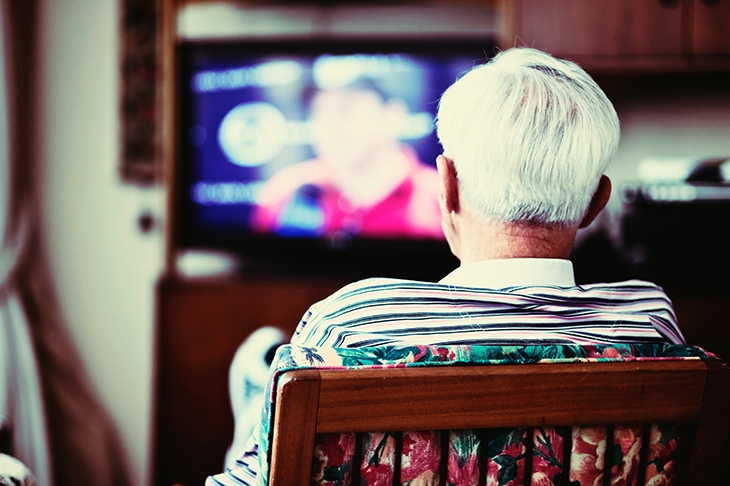If I were a pensioner, I’d be a bit miffed by the BBC’s decision to end the policy of giving free TV licences to the over-75s. At present, the cost is met by the government, but it was due to be picked up by the BBC from 1 June 2020. At least, that’s what I thought — and I had good reason. According to a report on the BBC News website dated 6 July 2015, the Beeb would ‘cover the cost of providing free television licences for over-75s’ and ‘in return… the licence fee will rise with inflation’. The story referred to this as a ‘deal’ made with the government in the run-up to the renewal of the BBC charter in 2017.
But on Monday the BBC announced that it wouldn’t be paying for this after all, even though the licence fee went up in line with inflation in 2017 for the first time since 2010, then again in 2018, and again this year. As of next year, the BBC will provide free TV licences only to those over-75s who receive the pension credit — about 1.5 million people, or just over a quarter of the total.
Explaining this flip-flop, the BBC chairman Sir David Clementi said: ‘Copying the current scheme was ultimately untenable. It would have cost £745 million a year by 2021/22 — and risen to more than one billion by the end of the next decade.’ The BBC press release announcing the decision said that if it were to pick up the cost of the current scheme in full it would mean the closure of BBC2, BBC4, the BBC News Channel, the BBC Scotland TV channel, Radio 5 Live and a number of local radio stations.
Some might see that as a bargain, but the odd thing about this rationale is that Tony Hall, the director-general, boasted in 2015 about what a good deal he’d negotiated on the state broadcaster’s behalf — and that included the commitment to providing free TV licences to everyone over 75. ‘Far from being a cut, the way this financial settlement is shaped gives us, effectively, flat licence fee income across the first five years of the next charter,’ he said. ‘If anything, I believe it will put the BBC slightly up.’
How did the BBC’s projected annual budget go from ‘slightly up’ in 2021/22 (within just five years of the charter’s renewal, after all) to £745 million in deficit? Even Gary Lineker’s salary doesn’t come to quite that much. If Auntie can lose three quarters of a billion down the back of the sofa every year, little wonder the female presenters are cheesed off about not being paid as much as their male counterparts. No need for Huw Edwards, John Humphrys, Nick Robinson, Jon Sopel, Jeremy Vine and Nicky Campbell to agree to a salary reduction, as they did last year. Just ask the director-general to whip out his fountain pen, do another back-of-the-envelope calculation and conjure up a few more million.
Needless to say, the BBC doesn’t acknowledge this is a U-turn. I spoke to someone in the press office who explained the Beeb had only ever agreed to ‘take responsibility for the policy’ of providing TV licences to the over-75s, and that didn’t mean agreeing to pay for them. And that’s what it had done. It had taken responsibility for the policy and decided, in a responsible way, not to pay for it any more. That brought me up short. Had I misread the BBC News story from 2015? I looked at it again. Under the heading ‘Key points’, the first bullet reads: ‘The BBC to take responsibility for funding free TV licence fees for the over-75s.’ Does ‘take responsibility for funding’ mean something different from paying for it? If so, no one told the headline writer. At the top of the story it says in big bold letters: ‘BBC to fund over-75s’ TV licences.’
The real scandal here is that the BBC is still able to impose a flat tax on anyone who owns a television set, whether they watch its programmes or not. I pay monthly subscriptions to Netflix, Amazon Prime and Now TV because I value their content. Why should I or anyone else be forced to pay £154.50 every year for content we have almost no interest in, on pain of being fined up to £1,000?
The American humorist H.L. Mencken once observed that the prices at New York’s 21 Club were so high there must be a ‘laughing room’ in the basement: a soundproof booth where the owners assemble to roar with laughter at all the suckers streaming in through the doors. There must be a laughing room somewhere in the bowels of Broadcasting House too — and I suspect Baron Hall of Birkenhead and Sir David Clementi are regular visitors.







Comments